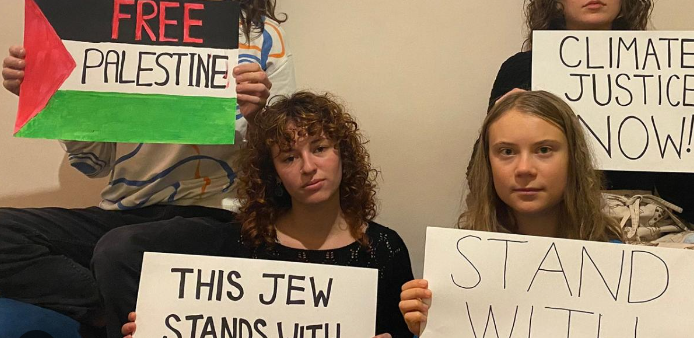
Greta Thunberg’s Social Media Stance on Israel-Palestine Conflict: A Comprehensive Analysis
In a recent development highlighting the complex dynamics of the Israeli-Palestinian conflict and global responses to it, environmental activist Greta Thunberg’s social media activity has sparked controversy. Amidst the backdrop of escalating violence in Israel, marked by tragic events including civilian casualties and acts of terrorism, Thunberg’s post featuring a “Stand with Gaza” sign alongside friends holding “Free Palestine” and “Climate Justice Now!” placards has drawn criticism for its perceived insensitivity towards the plight of Israeli victims.
Critics argue that Thunberg’s post, which does not explicitly mention Israel or Israelis, overlooks the suffering of those affected by the conflict, including the loss of civilian lives and the psychological impact on the Jewish community. With over 7,500 rockets fired towards Israel, a nation comparable in population to Sweden but with significantly less land area, the situation presents a complex humanitarian crisis.
Thunberg, known for her fact-based approach to activism, particularly in the realm of climate change, has been accused of adopting a one-sided stance on the Israeli-Palestinian conflict. This is seen as a departure from her usual emphasis on evidence-based solutions, drawing parallels to those who deny the realities of COVID-19 or climate change based on uninformed assertions.
Protect Your Privacy With One Click
The Israeli-Palestinian conflict, characterized by its historical depth and political intricacies, involves nuanced issues such as the withdrawal of Israeli forces from Gaza in 2005, the role of Hamas in the Gaza Strip, and the repeated refusals of Palestinian leadership to accept offers for a state. Israel’s military capabilities, juxtaposed with its attempts to establish peace and limit civilian casualties, add further complexity to the discourse.
Following the backlash, Thunberg revised her post, initially removing an octopus plush toy perceived as an antisemitic symbol, and later affirming her opposition to antisemitism and Hamas’s attacks. However, her emphasis on “justice and freedom for Palestinians and all civilians” continues to fuel debate.
This incident underscores the delicate balance required in addressing the Israeli-Palestinian conflict, where advocacy for one side can be perceived as a dismissal of the other’s struggles. It also highlights the challenges faced by public figures in navigating politically sensitive issues, where their influence can significantly impact public perception and sentiment.




Average Rating